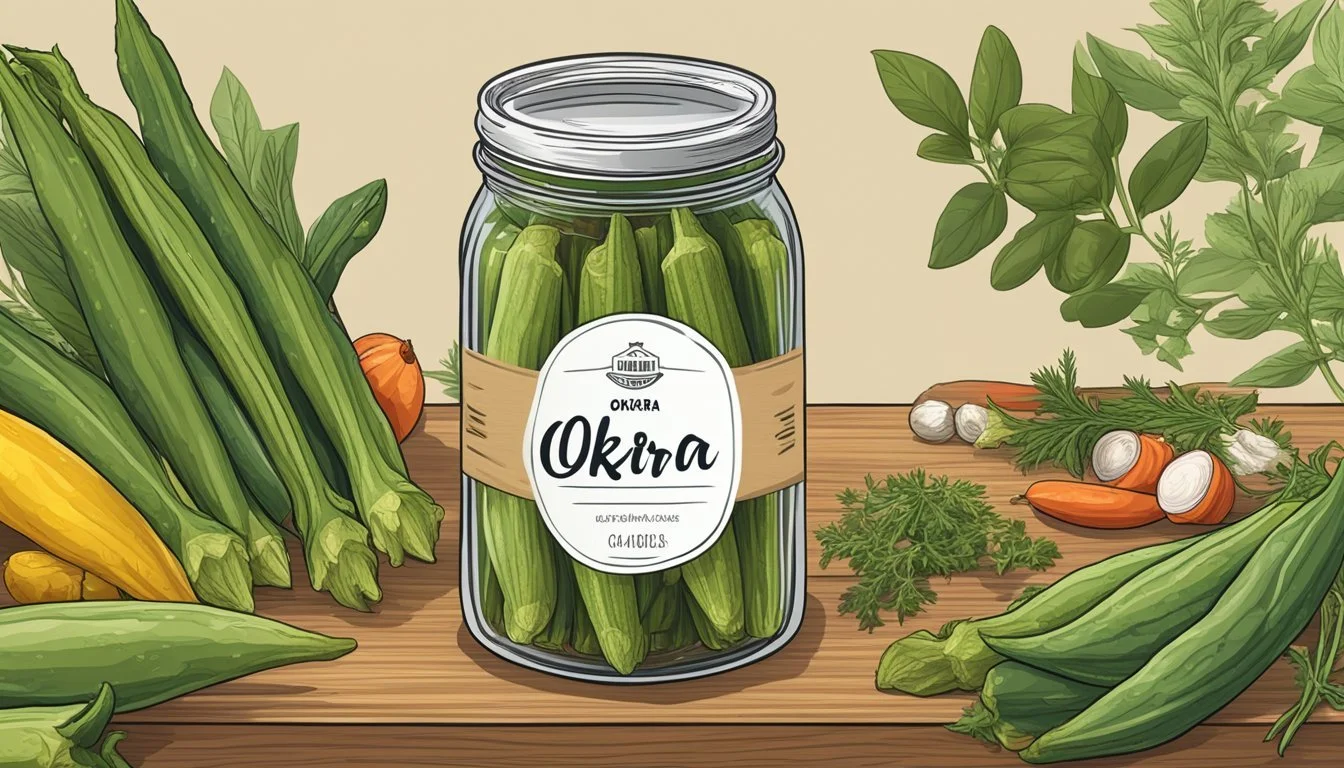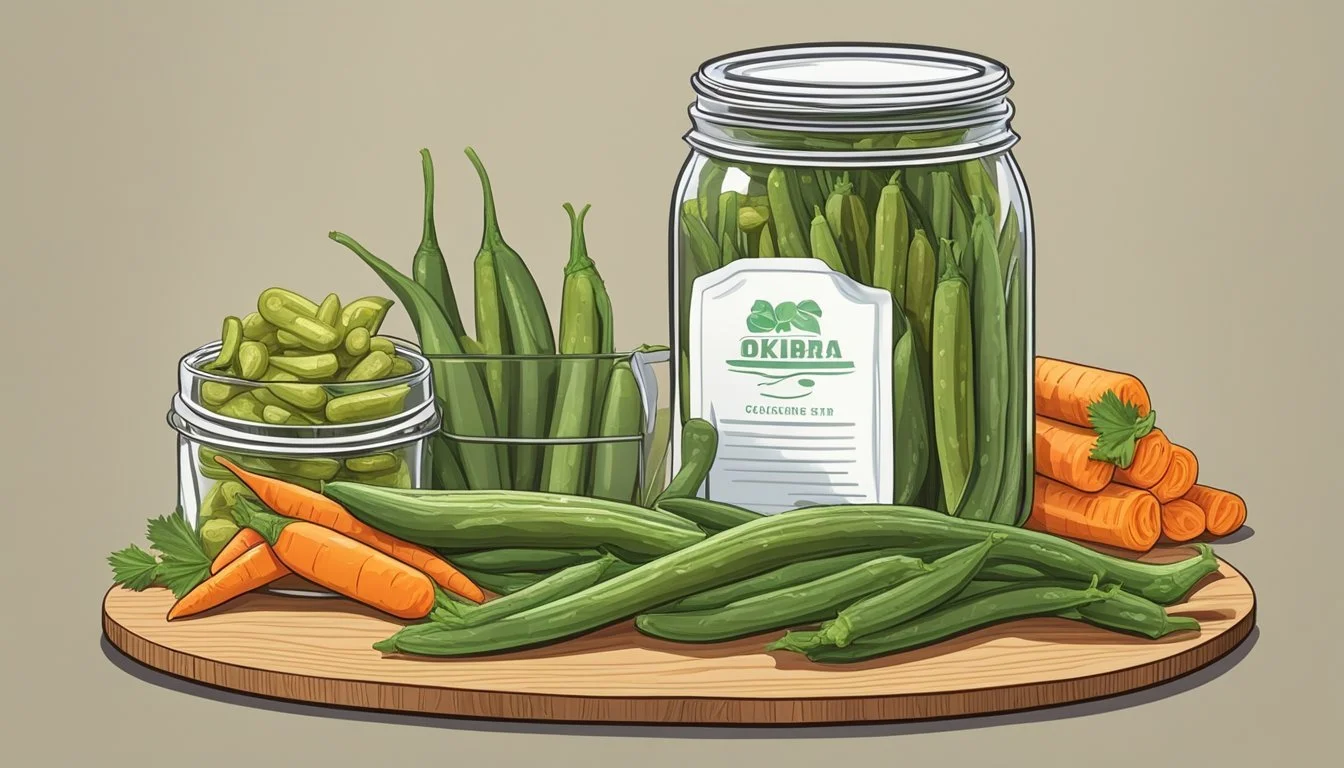Pickled Okra Substitutes
Best Alternatives for Recipes
For those who crave the delightful crunch and tang of pickled okra but can't find it or prefer a different flavor, there are excellent substitutes available. Pickled green beans, for instance, offer a similar crispiness and are a great alternative in dishes that require an acidic bite. Another worthy substitute is pickled asparagus, which provides a distinct yet complementary taste to various recipes.
Eggplant can also serve as a substitute for okra. While the flavor profile differs, its texture holds up well in pickling processes. Pickled cucumbers or gherkins are another versatile option that can easily replace pickled okra in salads and sandwiches.
For those looking to replicate the slimy texture of okra in pickled form, pickled zucchini might just be the closest match. Whether you're making gumbo, jambalaya, or just looking for a flavorful side dish, these alternatives can ensure your recipes remain vibrant and satisfying.
Understanding Pickled Okra
Pickled okra is a nutritious vegetable valued for its unique texture and flavor, often used in various dishes from gumbo to salads. Properly pickled, it retains numerous vitamins and antioxidants, making it a healthy addition to any meal.
Nutritional Profile
Pickled okra offers multiple health benefits. It is rich in vitamins A, C, and K, which are essential for maintaining healthy skin, boosting the immune system, and promoting blood clotting. Additionally, pickled okra is a good source of dietary fiber, aiding in digestion and helping to regulate blood sugar levels.
The presence of antioxidants like polyphenols helps combat oxidative stress and inflammation. Despite the pickling process, many of these nutrients remain intact, making pickled okra a valuable component of a healthy diet.
Culinary Uses
Pickled okra is versatile in the kitchen. It can be a crunchy addition to salads, providing both texture and a tangy flavor. It also enhances dishes like gumbo, where its unique taste and slight slipperiness can make the stew heartier.
Other popular uses include adding it to sandwiches or serving it as a standalone snack. Pickled okra pairs well with various meats and cheeses, making it a favorite in charcuterie boards and antipasto platters. The pickling process adds a savory depth that elevates any dish.
Why Replace Pickled Okra?
Replacing pickled okra in recipes might be necessary due to availability, dietary preferences, and texture considerations. Exploring why substitutions might be needed helps find the best alternative for various needs.
Availability Issues
Pickled okra may not always be available in local markets. Seasonal variations can affect the supply of fresh okra, leading to limited stock for pickling.
Importing pickled okra from other regions can be costly, making substitutes a practical choice. Green beans and zucchini are often more accessible and can serve as suitable replacements in pickled form.
For recipes requiring a crunchy side dish, pickled green beans can bring similar flavor and texture. They're widely available, even during off-seasons.
Dietary Preferences
Dietary choices sometimes necessitate swapping out pickled okra. Some people avoid okra due to its slimy texture, preferring crunchier options.
Gluten-free diets might also lead individuals to choose alternatives that better fit their nutritional needs. Okra is naturally gluten-free, but some pickling processes might introduce gluten-containing ingredients.
Vegetarians and vegans may look for plant-based substitutes. Pickled zucchini often works well, maintaining a similar vegetable crunch without the mucilaginous quality.
Textural Considerations
Texture plays a critical role in food preferences. Pickled okra has a signature slimy texture that isn't favored by everyone.
For those seeking to avoid this texture, green beans offer a crisp and crunchy bite as a pickled alternative. They retain more firmness and provide a satisfying snap, enhancing the eating experience.
In salads or as side dishes, pickled green beans and pickled zucchini maintain their structure better than okra. This makes them ideal for recipes where a crunchy texture is preferred over a slimy consistency.
These considerations guide decision-making when replacing pickled okra, ensuring the chosen substitute aligns well with needs and culinary contexts.
Best Substitutes for Raw and Cooked Okra
When you need a substitute for raw or cooked okra, suitable alternatives can be found among various vegetables and thickening agents.
Vegetable Alternatives
Various vegetables can be used as substitutes for okra in both raw and cooked dishes. Green beans are an excellent option with a similar crunchy texture, making them versatile in salads or cooked dishes. Zucchini is another popular choice due to its availability and mild flavor, which works well in a range of recipes.
Eggplant offers a meaty texture, suitable for dishes requiring a hearty substitute. Broccoli florets add a vibrant color and texture, performing well when steamed or stir-fried. These options ensure that the dish retains a pleasant texture and aesthetic appeal.
Vegetable Best Used For Green Beans Salads, stir-fries Zucchini Sautéed, roasted Eggplant Stews, grilled Broccoli Florets Stir-fries, steamed
Thickening Alternatives
If thickening is the primary role of okra, several ingredients can replicate this function. Cornstarch is a common thickener, perfect for soups or sauces. Mix it with a small amount of cold water to create a slurry before adding it to your dish.
Arrowroot powder offers a similar thickening capability with a neutral taste and is an excellent option for clear soups. Xanthan gum is a potent thickener used sparingly, best for sauces and salad dressings. Roux, a mixture of flour and fat cooked together, stands out as a traditional thickening method, especially in creamy soups and stews.
Thickener Best Used For Cornstarch Soups, sauces Arrowroot Clear soups, sauces Xanthan Gum Salad dressings, sauces Roux Creamy soups, stews
These alternatives ensure that your dish maintains its desired consistency and flavor, even without okra.
Preparing Substitute Ingredients
When looking to replace pickled okra, ensure the substitute matches the texture and flavor profile. Key areas to focus on include the methods of cooking and seasoning.
Cooking Techniques
Frying: Zucchini and green beans can be sliced and fried to match the crispy exterior of pickled okra. Lightly coat the substitutes in flour or cornmeal for better texture.
Roasting: To replicate the roasted flavor, try eggplant or zucchini. Cut them into small pieces, toss with olive oil, salt, and pepper, and roast at 400°F until tender.
Grilling: Nopales (cactus pads) offer a unique alternative. Season them lightly with salt, pepper, and a drizzle of lime juice before grilling.
Stews and Soups: For soups and stews, okra’s thickening property can be substituted with gumbo filé. This fine powder from sassafras leaves should be added toward the end of cooking for the best result.
Seasoning and Flavoring
Filé Powder: This Cajun ingredient is vital for replacing okra in gumbo. Add filé powder to achieve the thick, earthy flavor essential to this dish. Use approximately one teaspoon per serving.
Acidic Ingredients: Vinegar or lemon juice can help replicate the tanginess of pickled okra. When pickling substitutes like green beans or cucumbers, incorporate these acidic components into the brine.
Herbs and Spices: Dill, garlic, and mustard seeds can enhance the flavor profile of your pickled substitutes. For a more defined taste, consider adding cayenne pepper or paprika.
These techniques and seasonings will help achieve the nearest match to your pickled okra.
Health and Dietary Considerations
When considering substitutes for pickled okra, it is important to look at options that are low in calories and high in fiber. The following sections will cover alternatives that support various health needs such as managing diabetes, coronary heart disease, and high blood pressure.
Low-Calorie Options
Choosing low-calorie substitutes for pickled okra can support weight management and reduce the risk of conditions like metabolic syndrome and coronary heart disease. Vegetables such as cucumber, zucchini, and green beans are excellent low-calorie alternatives. Cucumbers, for instance, have a high water content and are very low in calories. Incorporating such vegetables can help manage caloric intake while still providing essential nutrients.
Zucchini is another great option. It is low in calories and versatile in recipes, making it easy to add to salads or as a cooked side dish. These substitutes not only help in maintaining a healthy weight but also provide vitamins and minerals such as vitamin C and folate, which are beneficial for overall health.
High-Fiber Alternatives
For those focusing on digestive health and managing conditions like diabetes and high blood pressure, high-fiber substitutes are crucial. Artichokes, Brussels sprouts, and lentils are rich in fiber and make excellent replacements for pickled okra. High-fiber foods are essential for maintaining good digestive health and can help regulate blood sugar levels.
Artichokes offer a substantial fiber content that aids in digestion and can help lower cholesterol levels. They also contain magnesium, which is beneficial for heart health. Brussels sprouts are another fiber-rich vegetable that supports gut health and provides additional vitamins such as vitamin C and folate.
Incorporating high-fiber alternatives can aid in weight management and support cardiovascular health, making them excellent choices for those looking to substitute pickled okra.
Global Perspectives on Okra Substitutes
Different regions around the world have found unique substitutes for pickled okra. These alternatives often reflect the local cuisine, ingredients, and culinary traditions.
North American Influences
In North America, File Powder stands out as a popular substitute for okra, especially in Cajun dishes like gumbo. Made from ground sassafras leaves, it acts as a thickening agent, similar to okra.
Green beans are another common substitute. They offer a similar texture and are widely available in fresh or frozen form. Zucchini is also frequently used due to its availability and versatility in cooking methods.
These substitutes not only match okra's texture but also provide similar nutritional value, ensuring that dishes remain healthy and balanced.
Indian and Tropical Variations
Indian cuisine, known for its rich and diverse flavors, often substitutes okra with ingredients like eggplant and green beans. In curries, these vegetables absorb the spices beautifully, making them perfect alternatives.
In tropical regions, local plants such as asparagus and mushrooms serve as suitable substitutes. These ingredients are readily available and fit well in various traditional dishes.
Arrowroot powder can also replace okra in some tropical recipes, providing a similar thickening effect without altering the dish's flavor profile. This enables cooks to maintain the dish's authenticity while adapting to ingredient availability.





